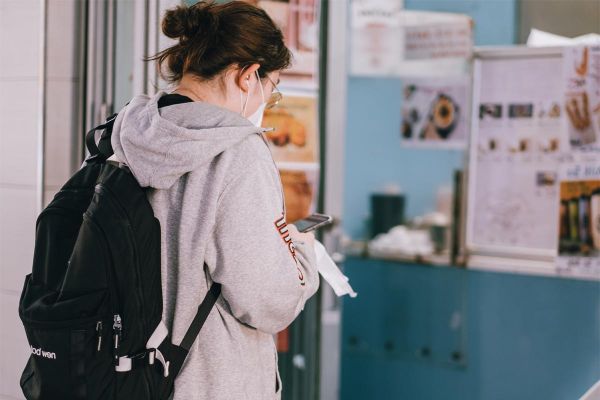 Being a student is never easy. Under normal conditions, students are one of the most stressed demographics in the nation. Now, with a global pandemic forcing changes to work, study, and personal lives, that stress is at an all-time high. Chances are, your work, study, and personal life has been completely disrupted. While many universities are switching to online classes, others are asking students to continue coming into class, potentially putting themselves and family at risk. Teachers are less available, your co-students are more stressed, and you likely have to worry about the safety of your friends and family.
Being a student is never easy. Under normal conditions, students are one of the most stressed demographics in the nation. Now, with a global pandemic forcing changes to work, study, and personal lives, that stress is at an all-time high. Chances are, your work, study, and personal life has been completely disrupted. While many universities are switching to online classes, others are asking students to continue coming into class, potentially putting themselves and family at risk. Teachers are less available, your co-students are more stressed, and you likely have to worry about the safety of your friends and family.
It’s understandable that you would be stressed in this environment. It’s also understandable that stress will make studying, living, and enjoying yourself more difficult. Yet, it’s important to take time to care for your mental health, even during a global pandemic. These 7 tips should help you improve your mental health, whether you’re struggling or not.
Stay Social, Safely
Humans are social creatures. Even if you like being alone, it’s important to see people. Unfortunately, video calls and social media aren’t always enough. The human social drive pushes you for skin contact, in-person contact, and intimacy. You can account for some of this by talking to friends and family online and with video calls, but not all of it.
- Select a small circle of friends and family to see. Discuss safety with them and limit who you see outside the group
- Choose one intimidate partner and establish safety rules. The fewer people you see, the better
- If you are staying in a dormitory, consider establishing mealtime and community events together. As you’re likely already exposing each other to risk, spending time together does not necessarily increase risks.
The fewer people you see, the better. But, you can’t expect to not see people. Make sure you maintain a rich social life with plenty of human contact. This should involve regular virtual contact with friends and family as well as limited in person and physical contact with individuals who agree to practice social distancing with others.
Practice Mindfulness
Mindfulness, or the practice of living in the moment, is a stress reduction technique. The practice has its roots in eastern meditation but today, has been integrated into psychotherapy. Mindfulness-Based Stress Reduction (MBTR), mindful living, and mindfulness courses can all help you to manage and reduce stress.
Mindfulness can be taught through therapies like CBT and DBT. You can also learn through meditation and MBTR courses. The idea here is to invest in your mental health by taking time to destress, to calm down, and to give yourself tools to cope with life. Mindfulness practices are ideal for this because people who spend time on them consistently report being less stressed, having fewer negative reactions to the same events, and returning to a state of calm more quickly. You might find the same results in other practices such as regular therapy, exercise, or another mental health practice. Try different options to figure out what works best for you and your lifestyle.
Prioritize Your To-Do List
Students are often stressed by busy workloads, deadlines, and external pressure. Modern students are pressured to perform well, to pass exams, and to look good while doing it. While you could drop some of those stressed by cutting social media, you don’t necessarily have to. Instead, prioritize your to-do list, take on workloads you can handle, and focus on getting stressful items out of the way first.
- Set reasonable goals and expectations. If you can’t study for 4 hours straight, don’t plan to.
- Prioritize your to-do list. You will get stressed and drop the ball. As a popular saying goes, it’s important to know which balls are glass and which are rubber before you drop them.
- If you’re struggling, take advantage of coaching offered by your college or university. You may be able to find solutions that work for your needs.
If you’re feeling pressured, you may also want to prioritize where you’re investing time. For example, college students often report Instagram and snapchat as a source of stress, where they feel like they have to appear to be doing well at all costs. If that’s the case, try dropping activity on those social networks for a few weeks to see how you feel.
Take Time Out
 Everyone needs a break. Students often find themselves in never-ending cycles of work, study, and family obligations. If you’re not studying, you have a part (or full) time job, are visiting family, or taking care of something else. When you do take time off, it’s full of guilt and stress because you should be doing something else, right? Wrong. Consider scheduling in days to do nothing, where you can stay home to read, Netflix, or otherwise relax. Time out is important for your mental health.
Everyone needs a break. Students often find themselves in never-ending cycles of work, study, and family obligations. If you’re not studying, you have a part (or full) time job, are visiting family, or taking care of something else. When you do take time off, it’s full of guilt and stress because you should be doing something else, right? Wrong. Consider scheduling in days to do nothing, where you can stay home to read, Netflix, or otherwise relax. Time out is important for your mental health.
Eat Well
You won’t always have the time or the means to cook healthy meals. But, it’s important that you try to eat well. Nutritional health heavily impacts your mental and physical well-being. In fact, nutritional deficiencies can contribute to and mimic the symptoms of mental illnesses like anxiety disorder and depression. Ensuring that you eat plenty of fruits and vegetables and a diverse diet can be essential to ensuring you stay mentally healthy.
This doesn’t mean taking on a diet or making mealtime very complex. Instead, try following simple and free guidelines, like those offered by MyPlate, where you have 3 or more servings of fruit, 2 or more servings of vegetables, etc.
Exercise
Exercise can contribute to your mental health in several ways. Regular exercise can boost your self-esteem as you grow more physically capable. It can also improve energy levels, reduce immediate depression, and boost happiness for as long as 2 hours after you exercise. Exercise improves blood flow, increasing oxygenation of the blood and muscles. This results in more energy and less fatigue, unless you have a heavy workout. It also boosts neurotransmitter activity, triggering the reward system with serotonin production. This means exercise can help you destress as well.
At the same time, it’s important to keep in mind that exercise doesn’t have to be a grueling affair at the gym or track. Your university might offer free gym facilities and you can feel free to use them. However, exercise doesn’t have to be difficult or boring to be effective. Walking, cycling, yoga, swimming, and sports all count. There are also plenty of activities you can take part in if you’re disabled or lack mobility.
Avoid Drugs and Alcohol
Many of us turn to drugs and alcohol to temporarily reduce stress and to combat boredom. But, over the long term, substances can actually degrade mental health. While there’s nothing wrong with occasionally having a few drinks with friends, you should try to keep alcohol consumption to a minimum. This means following recommended guidelines of no more than 2-3 servings of alcohol per day, and hopefully not more than a few times a week.
Everyone is experiencing a significant level of stress due to Covid-19. If you’re also going to college, you have to cope with deadlines, tests, and new workloads. That can be a lot. Make sure you take time to talk to counselors, to take care of your mental health, and to seek out help if you need it. There’s no shame in not being okay and there’s no shame in getting professional help.
Good luck with class. You can do this!